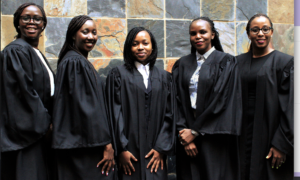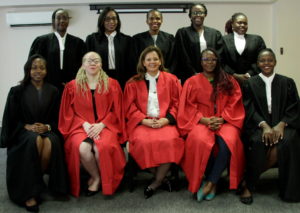Gender and sexuality are everyday realities to be navigated in every aspect of our lives. We live in systems predetermined and often violent towards us based on gender and sexuality. Systems include or exclude based on the gendered power held, gender identity, and expression. When sexuality and sexual orientation are still very much debated, legislated, and controlled by states, then the struggle to free oneself means confronting these systems and seeking to dismantle those aspects that degrade us, reform others and bring new thought and evidence on sexuality to match our legal frameworks. In many African countries, legal systems are an inherited colonial legacy and even when reforms have been carried out, the practice often takes decades to catch up while in some cases we have witnessed regression in guaranteeing and protecting rights.
Even where the laws are progressive, gender bias in dispensing justice remains prevalent in many legal systems on the continent. Gender discrimination and marginalisation affect the right to equal access to justice. Existing gender power dynamics and beliefs determine who can access justice and the outcomes of justice processes. While many governments have strengthened the rule of law and talk about equal access to justice and ending discriminatory laws, the progress has been slow and sometimes uneven.
A new publication, ‘Sourcing for Gender and Sexuality Cases’ by the Initiative for Strategic Litigation in Africa (ISLA), interrogates the barriers to identifying and retaining cases for feminist strategic litigation and proposes strategies to take them on. This is in response to the dearth of cases for strategic litigation on women’s rights and sexual rights at both national and African regional levels.
“These cases are in response to human rights routinely violated across the continent, but few cases seek to hold perpetrators accountable,” says Sibongile Ndashe, ISLA Executive Director. “Even when victims attempt to seek legal recourse, very few cases are litigated until the end. Understanding why this happens and finding a solution is something that has preoccupied many who work in the field.”

Strategic litigation is understood as the litigation of a public interest case that will have a broad impact beyond the specific interests of the parties involved, according to M Roa & B Klugman.
“It is particularly well suited ‘where there is a situation of social marginalisation, and there is a need for deliberate and careful planning aimed at long term change that will improve the situation of marginalised groups.”
Feminist strategic litigation encompasses approaches deployed “to challenge historically gendered exclusion through framing and claiming entitlements under the law towards the full realisation of the rights of women in all their diversity as well as sexual minorities”. African feminists are increasingly using feminist strategic litigation as a pathway to social change through a multiplicity of processes in and out of court. Gender inequality continues to manifest in many laws which extend marginalizations in lived realities.
ISLA has used feminist strategic litigation within domestic and regional courts to advance gender justice, combating systemic discrimination and oppression against women and sexual minorities. This means challenging patriarchy and class power relations by centering women and sexual minorities, and while advocating for the rule of law within African domestic and regional courts to advance sexual and women’s human rights. Cases have included those that cover sexual and reproductive health and rights, violence against women, women’s socio-economic rights, and practices and procedures.
While litigation is one of the tools feminists have in the fight for gender equality, key barriers remain in sourcing the cases to bring before the courts. Highlighted in this publication is a lack of legal empowerment of victims, first responders, and lawyers as one of the primary barriers.
“Oftentimes, victims of rights violations cannot name what happened to them as a violation that should attract legal redress,” notes the publication. “This inability to recognise what constitutes a violation also extends to first responders and lawyers that may interact with the victim. This individual and collective inability to identify violations constitute a lack of legal empowerment which is a barrier to case sourcing.”

This lack of legal knowledge of discrimination applies to instances where the law itself is discriminatory and it is especially difficult to see this discrimination where it does not present itself in overt ways and particularly where the law seems gender-neutral, which may mean that certain categories of people are excluded from protection.
Perceived and attitudinal barriers also hinder case sourcing, predominantly where there are misconceptions of the law around criminalisation that impede reporting of human rights violations by certain groups of people such as sexual minorities, sex workers, and victims of trafficking. They are deemed as being outside the protection of the law, and hence such perceptions hinder victims’ access to service points such as health facilities, psychosocial services, and law enforcement services. This discourages victims from reporting violations or engaging with the justice system, which they fear might be to their detriment.
The depoliticisation of non-governmental organisations (NGOs) and civil society actors generally is another barrier. Depoliticisation has led to creating a false dichotomy in which strategic litigation is seen as being in opposition to other approaches that are considered less aggressive, such as advocacy. Further, ideological contestations and disconnect among lawyers, social movements, NGOs, activists, and other actors involved in the process of strategic litigation compromise trust. This negatively affects the sourcing cases that frame issues before courts in a way that is representative of victims’ interests and priorities.
“Movements are the avenue for politicising constituencies of women and people who experience human rights violations. The lack of a movement-backed ideology and theory of change also compromises the process of successfully sourcing a case with the right match, i.e. finding the right client for the right litigation issue. The right ideology emerges from a litigation strategy that is embedded in social movements.”
Deficiencies in victims’ care are significant barriers to the sourcing and retention of strategic litigation cases. Failure to provide a comprehensive package of care means that victims may face certain obstacles that can obstruct or frustrate their access to justice and resultantly also impede case sourcing and lead to attrition of cases. For instance, in women’s land and property rights, safety and security issues can arise when threats persist in enforcing the court order awarding her a share in the matrimonial property or in succession cases when a woman tries to claim her share of the inheritance.
Finally, a hostile environment in the sense of the personal, legal, political, socio-cultural, or economic context can also inhibit the process of rights-claiming.
“In repressive contexts, while some NGOs may be interested in pursuing strategic litigation, existential threats, fear of reprisal or being profiled as aggressive and antagonistic creates a hostile environment which is a barrier to case sourcing.”

Recommendations
Legal empowerment: Ensure there’s a process through which women and sexual minorities become protected and are enabled to use the law to advance their human rights. It is carried out by expanding protection and opportunity, protecting them from injustices, and ensuring equal opportunities.
Create an enabling environment for strategic litigation by advancing human rights and access to justice for women and girls, especially the most marginalized, respecting, protecting, and fulfilling women’s rights. The access to justice framework, legal resources, and multi-disciplinary support services go beyond court victories. It is important to go beyond the question of the sufficiency of laws and the legal system to social change and reconstruction.
Collaboration, coordination, and movement building: Social movements are crucial in utilizing litigation strategies to pursue social change. Strategic litigation partnerships must be founded on a shared ideological and political orientation. There is a need to re-imagine strategic litigation as part of a broader legal mobilisation strategy that benefits from multiple processes both in and out of court.
The package of care for victims: How strategic litigation is funded impacts on the package of care. Litigants should collaborate with relevant partners to determine, before litigation, the support services required to facilitate a victim’s participation in the litigation.
Feminist litigation contributes to the empowerment of women, girls, gender, and sexual minorities and their communities, dismantling oppressive systems and improves chances at justice within the justice system. This publication is timely and builds on ISLA’s experience in setting legal precedents and jurisprudence towards victim-centred and gender-aware justice processes. The publication is important for feminists, activists, and legal advocates to expand their approaches as they seek to combat systemic discrimination and oppression.
Bio:
Sinawo Bukani is a South African feminist writer and lifestyle content creator. Her expertise lies in developing rich and compelling content that explores what the ideal world should be for women. Linkedin: Sinawo Bukani. Find her on Twitter: @sinawobookani
